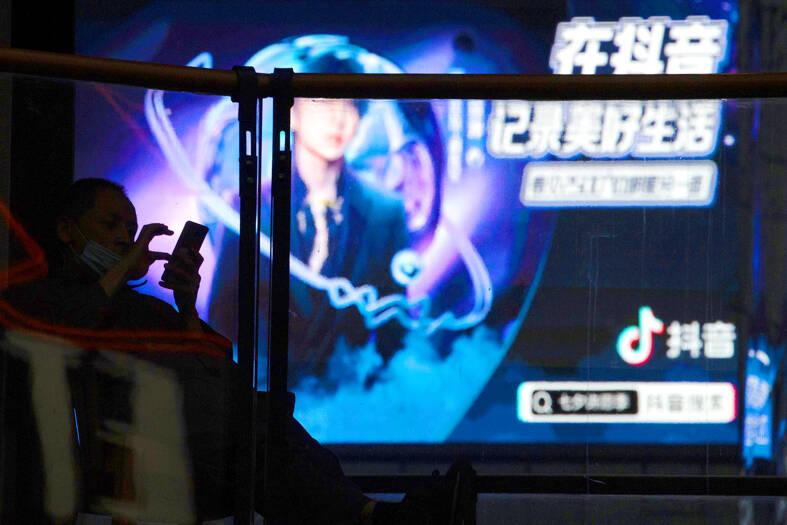Beijing is targeting young Taiwanese voters through Douyin(抖音), an official said yesterday, adding that videos shared on the platform by China aim to sow distrust in Taiwan’s government and military.
China-made videos targeting young Taiwanese have four aims: to incite a sense imminent war if the Democratic Progressive Party (DPP) is re-elected, to vilify Taiwan’s conscription policy, to foster pro-China sentiment and to manipulate attitudes toward key policy issues, the Taiwanese official said.
China’s state-backed Global Times and other Chinese news outlets have recently published a series of reports denigrating the DPP in a bid to generate negative opinions toward the party in Taiwan.

Photo: AP
The reports include edited video from Taiwanese media to present skewed takes on certain issues.
“The Chinese Communist Party [CCP] has defined this election as a choice between ‘war and peace’ and continues to spread the threat of war through China’s state media,” the source said, adding that Beijing aims to push swing voters toward opposition candidates who would foster closer cross-strait ties.
“Pro-China candidates have even echoed these threats, claiming that a vote for the DPP is a vote to send young people to the battlefield. They are cooperating with the CCP to intimidate Taiwanese,” the source said.
The CCP is also attempting to convince young Taiwanese that conscription means they are sacrificing their studies, careers and futures, the source said.
“China basically intends to use cognitive warfare to foster negative views on the policies of the ruling party among young Taiwanese, all with an eye toward affecting the outcome of the election,” they said.
Government employees have been prohibited from using Chinese social media platforms, including Douyin and Tiktok(international version), since 2019.
The Executive Yuan in December last year said there is no legal basis for restricting public use of Douyin and TikTok, adding at the time that it would consult regulations in other countries and stakeholders in Taiwan to determine if there is a need to amend laws.
No concrete progress has been made on that issue, DPP Legislator Lai Jui-lung (賴瑞隆) said yesterday, urging the government to reference laws restricting TikTok in the US and Australia.
Legislating a blanket ban on Douyin and TikTok is difficult, as most users are young people who would oppose such a move, DPP Legislator Liu Shih-fang (劉世芳) said.
Cabinet spokesman Lin Tze-luen (林子倫) was unavailable for comment at press time.
Additional reporting by Hsieh Chun-lin

SECURITY: As China is ‘reshaping’ Hong Kong’s population, Taiwan must raise the eligibility threshold for applications from Hong Kongers, Chiu Chui-cheng said When Hong Kong and Macau citizens apply for residency in Taiwan, it would be under a new category that includes a “national security observation period,” Mainland Affairs Council (MAC) Minister Chiu Chui-cheng (邱垂正) said yesterday. President William Lai (賴清德) on March 13 announced 17 strategies to counter China’s aggression toward Taiwan, including incorporating national security considerations into the review process for residency applications from Hong Kong and Macau citizens. The situation in Hong Kong is constantly changing, Chiu said to media yesterday on the sidelines of the Taipei Technology Run hosted by the Taipei Neihu Technology Park Development Association. With

CARROT AND STICK: While unrelenting in its military threats, China attracted nearly 40,000 Taiwanese to over 400 business events last year Nearly 40,000 Taiwanese last year joined industry events in China, such as conferences and trade fairs, supported by the Chinese government, a study showed yesterday, as Beijing ramps up a charm offensive toward Taipei alongside military pressure. China has long taken a carrot-and-stick approach to Taiwan, threatening it with the prospect of military action while reaching out to those it believes are amenable to Beijing’s point of view. Taiwanese security officials are wary of what they see as Beijing’s influence campaigns to sway public opinion after Taipei and Beijing gradually resumed travel links halted by the COVID-19 pandemic, but the scale of

A US Marine Corps regiment equipped with Naval Strike Missiles (NSM) is set to participate in the upcoming Balikatan 25 exercise in the Luzon Strait, marking the system’s first-ever deployment in the Philippines. US and Philippine officials have separately confirmed that the Navy Marine Expeditionary Ship Interdiction System (NMESIS) — the mobile launch platform for the Naval Strike Missile — would take part in the joint exercise. The missiles are being deployed to “a strategic first island chain chokepoint” in the waters between Taiwan proper and the Philippines, US-based Naval News reported. “The Luzon Strait and Bashi Channel represent a critical access

Pope Francis is be laid to rest on Saturday after lying in state for three days in St Peter’s Basilica, where the faithful are expected to flock to pay their respects to history’s first Latin American pontiff. The cardinals met yesterday in the Vatican’s synod hall to chart the next steps before a conclave begins to choose Francis’ successor, as condolences poured in from around the world. According to current norms, the conclave must begin between May 5 and 10. The cardinals set the funeral for Saturday at 10am in St Peter’s Square, to be celebrated by the dean of the College